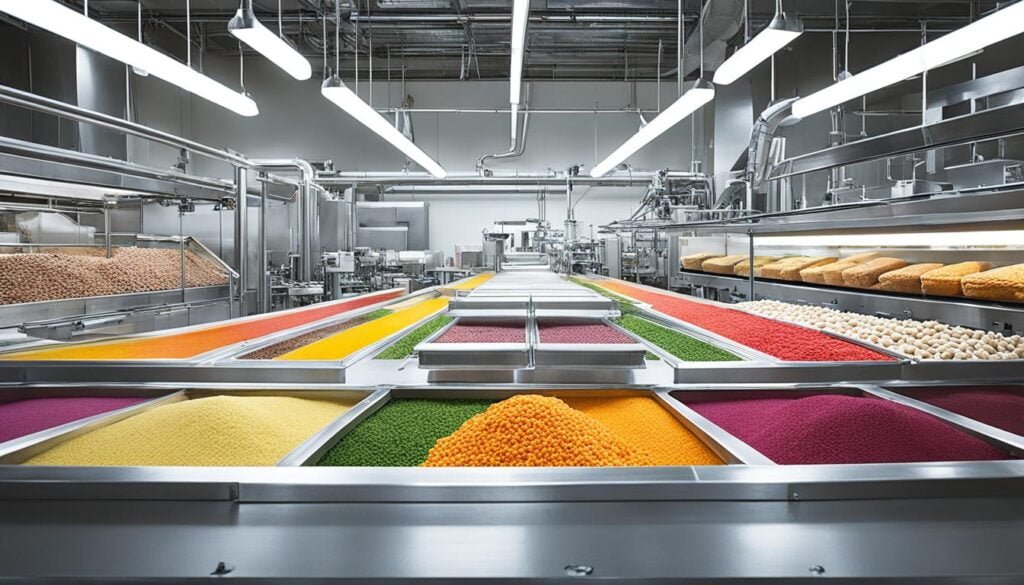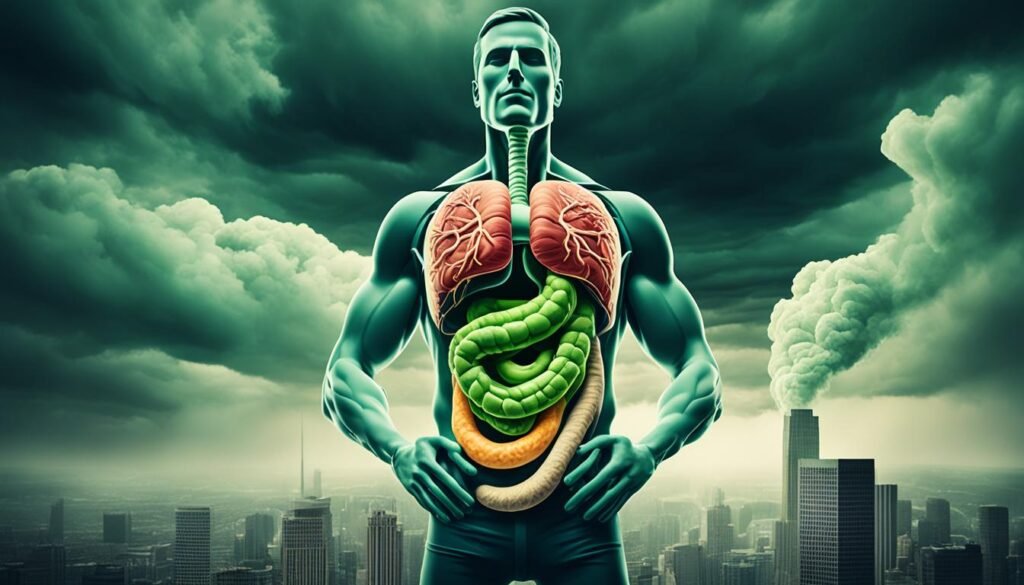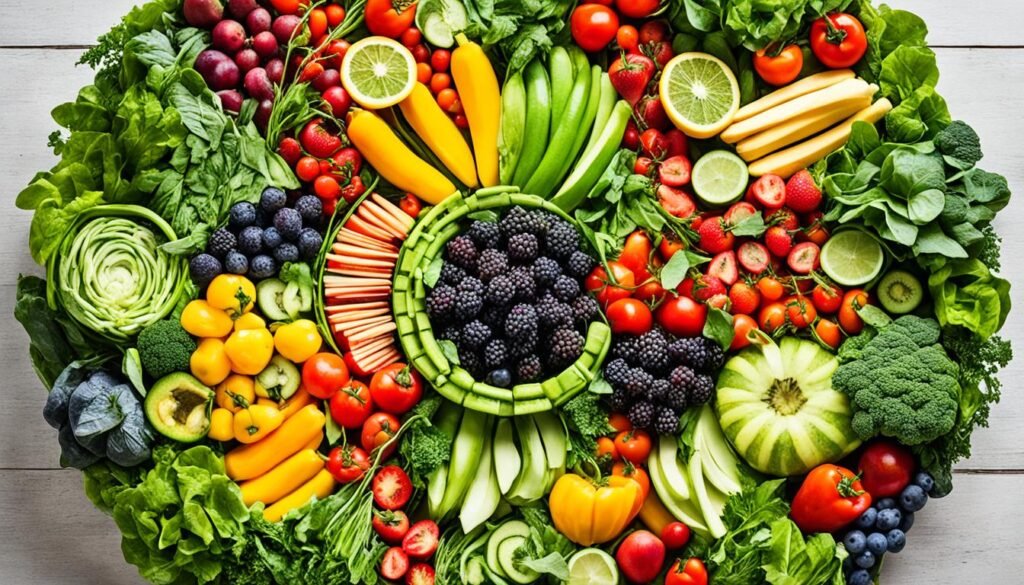
In today’s fast-paced world, ultra-processed foods stand at the heart of what we eat. They promise meals that are quick and convenient. Yet, hidden behind their appeal is a truth. These foods carry dangers that threaten our health. What are these risks? And how do they affect us?
Ultra-processed foods are known for being heavily processed and nutrient-poor. They’re packed with additives. You can find them everywhere, from refined carbs to artificial sweeteners. These mass-produced items fill our store shelves and fast-food places. They tempt us with their ease and taste.
Turning to ultra-processed foods has had serious effects. It’s tied to the rising levels of obesity worldwide. But that’s not all. These foods also up our chances of metabolic issues, heart problems, and digestive and mental health troubles. They even connect to some cancers. They’ve become a staple in many of our diets. So, knowing the risks they bring has never been more important.
Key Takeaways
- Ultra-processed foods are characterized by extensive processing, low nutritional value, and a long list of additives.
- These foods contribute to the global obesity epidemic and are linked to numerous health risks, including metabolic disorders, cardiovascular disease, and cancer.
- Convenience and affordability have made ultra-processed foods ubiquitous in modern diets, despite their hidden dangers.
- Understanding the hazards of ultra-processed foods is crucial for making informed dietary choices and prioritizing a healthier lifestyle.
- Breaking free from the grip of ultra-processed foods requires a focus on whole, unprocessed foods, mindful eating, and building a supportive community.
What are Ultra-Processed Foods?
Ultra-processed foods are now a big part of what we eat, giving us lots of choices and easy meals. But they’re more than just processed. They go through many changes that make them lose important nutrients and get artificial ones added.
Extensive Processing and Nutrient Removal
These foods are made by machines in factories using many steps like shaping and chemical changes. But all these processes take out good stuff like vitamins and fiber, making these foods less healthy. So, even though they give us lots of energy, they don’t have the nutrients our bodies need.
Artificial Additives and Preservatives
For better taste, look, and longer shelf lives, these meals and snacks have a lot of fake stuff in them. These include things like fake sugars, coloring, and chemicals that help them look and taste like real food. However, they might not be good for us and could cause health problems by messing with our bodies.
Ready-to-Eat Convenience
The big draw of these foods is how easy and quick they are to eat. They cover a range, from fast food to drinks and snacks. People love them because they make life simpler, but eating too much of them can hurt our health in the long run. It might not be the best for staying healthy and feeling good.
| Characteristics of Ultra-Processed Foods | Potential Consequences |
|---|---|
| Extensive mechanical and chemical processing | Nutrient depletion, loss of essential vitamins, minerals, and dietary fiber |
| Addition of artificial additives, preservatives, and flavors | Disruption of natural bodily processes, potential health risks |
| Designed for convenience, minimal preparation required | Overconsumption, reliance on nutritionally-deficient foods |
Health Risks of ultra-processed foods
Eating a lot of ultra-processed foods is a key reason for obesity around the world. They pack a lot of calories but don’t make you feel full. This can lead to eating too much and gaining weight. Besides, they can up your chances of getting health issues like diabetes, high blood pressure, and bad cholesterol. That’s because these foods have a ton of sugar, bad fats, and refined carbs.
Obesity and Weight Gain
Ultra-processed foods can cause you to overeat and put on extra pounds. They’re designed to taste really good, which can make it hard to eat healthily. This can make it tough for people to manage their weight.
Metabolic Disorders
Eating lots of sugar, bad fats, and refined carbs from ultra-processed food is bad news. It could lead to problems like diabetes, high blood pressure, and bad cholesterol. These are serious health issues for anyone who eats these foods regularly.
Cardiovascular Disease
A diet heavy on ultra-processed foods can spike your heart disease risk. This is because these foods have too much sodium, trans fats, and extra sugars. They could up your blood pressure, fuel inflammation, and mess with your cholesterol. All of these are big risks for heart disease.
| Health Risk | Impact of Ultra-Processed Foods |
|---|---|
| Obesity and Weight Gain | High caloric density and low satiety lead to overconsumption and weight gain. |
| Metabolic Disorders | Excessive sugar, unhealthy fats, and refined carbohydrates increase the risk of type 2 diabetes, hypertension, and dyslipidemia. |
| Cardiovascular Disease | Excessive sodium, trans fats, and added sugars contribute to elevated blood pressure, inflammation, and unhealthy cholesterol levels, increasing the risk of heart disease. |
Mental Health Implications
New studies show an interesting connection between eating ultra-processed foods and mental health. These foods might play a role in causing depression and anxiety. The things added to make these foods last longer could mess with the brain function and how we control our mood.
More and more, researchers are looking into how what we eat affects our mental health. They’ve found that eating a lot of these processed foods could actually be bad for us. Why? Because they don’t give our brains and our mood the stuff they really need to function well.
The bad stuff in ultra-processed foods, like chemicals and fake flavors, might throw off the way our brains work. This could mess with our emotions and how well we think. Those problems could lead to depression, anxiety, and more. It’s a big deal.
Also, these foods are usually high in calories but low in good-for-you stuff. Not getting enough of the vitamins, minerals, and antioxidants our body needs can be tough on our mental health. It makes it harder for us to handle stress and keep our brain function in good shape.
There’s a growing understanding that our diet really matters for our mental health. Choosing to eat less of the processed stuff and going for natural, whole foods might help. It’s a way to take care of our mental health and feel better overall.
Digestive Issues and Gut Health
Their low fiber content hurts our digestions. Ultra-processed foods don’t have the fiber our bodies need. This leads to problems like constipation and other gut issues.
Lack of Dietary Fiber
Processed foods miss out on the good fiber from natural foods. Fiber helps keep our bowels moving right and stops constipation. When we don’t get enough, our gut microbiome gets messed up. This can cause all sorts of stomach problems.
Disruption of Gut Microbiome
Eating ultra-processed foods harms the gut microbiome. This is our digestive tract’s helpful bacteria system. When this system is off, it can cause many health troubles. These start with digestive issues and can grow to more serious gut health worries.

Cancer Risk and Ultra-Processed Foods
New research shows a possible link between cancer risk and ultra-processed foods. This connection needs more study. But, its findings are important and we should pay attention.
Studies indicate that cancer could be tied to health risks in ultra-processed foods. These foods have lots of additives, preservatives, and are heavily processed. This could harm our bodies on a cellular level. It might lead to certain types of cancer.
| Type of Cancer | Potential Link to Ultra-Processed Foods |
|---|---|
| Colorectal Cancer | Processed meats, which are common in these foods, might raise the risk of colorectal cancer. Several studies back this up. |
| Breast Cancer | High levels of refined carbs and unhealthy fats in ultra-processed foods could up the chance of getting breast cancer. This is what the research shows. |
| Prostate Cancer | There might be a link between eating a lot of ultra-processed foods, especially those with many additives, and a higher risk of prostate cancer. At least, that’s what some studies say. |
The proof isn’t final, but the link between ultra-processed foods and cancer risk is a big health issue. It deserves more study and careful watching. Everyone should choose their food wisely. Going for whole, less processed foods is best for health.
Addictive Nature of Ultra-Processed Foods
The food industry designs ultra-processed foods to taste really good. They add a mix of sugar, salt, and unhealthy fats to make them hard to resist. This mix can lead people to eat more than they should, making it tough to stay healthy.
Engineering for Palatability
Companies spend a lot to learn how to make food taste great. They adjust the amounts of sugar, salt, and fat to make flavors people can’t ignore. This strategy is aimed at making us want more and more, tricking our brains into thinking we need it.
Sugar, Salt, and Fat Combinations
Ultra-processed foods use a blend of sugar, salt, and bad fats to make our brains happy. This triggers a response similar to what happens with drugs in our brains. People then find it hard to stop eating these foods, even when they know they should.
The Appeal of Ultra-Processed Foods
People are choosing ultra-processed foods more and more. They offer convenience and fit our quick lives. This is thanks to food industry’s smart marketing. Plus, they cost less than fresh foods.
Convenience and Busy Lifestyles
Our days are filled with many things. Ultra-processed foods are easy to get and eat. They save time since they don’t need much preparation. This is great for those who are busy with work and family.
Marketing Strategies
The food industry uses strong marketing to make ultra-processed foods seem great. They use cool ads and slogans to catch our eye. It can make us feel like these foods are our best choice.
Cost and Affordability
For some, ultra-processed foods are cheaper than fresh food. This makes them more attractive for people with less money. While these foods might have health risks, the savings can be more important to some.
Breaking Free from Ultra-Processed Foods
The key to leaving processed foods behind is to eat more whole, unprocessed foods. Look for a variety of fruits, vegetables, lean proteins, whole grains, and legumes. They are the foundation for a healthy, balanced diet.
Prioritizing Whole, Unprocessed Foods
When shopping, check ingredient labels closely. Choose foods with few additives, preservatives, and sugars. This habit helps you steer clear of unhealthy ultra-processed items.
Reading Ingredient Labels
Cooking your meals puts you in charge of your diet. You can use high-quality, whole ingredients. Plus, you can make food that meets your specific tastes and health needs.
Cooking at Home
Practicing mindful eating is vital for better health. It involves listening to your body’s hunger and fullness. This helps avoid eating too much, which is common with processed food.
Mindful Eating Practices
Focusing on whole, unprocessed foods, checking labels, cooking your meals, and eating mindfully are important steps. They help you leave processed foods and choose a healthier way to live.

Supporting a Healthier Lifestyle
Choosing a healthy lifestyle over ultra-processed foods is tough. Yet, with professional guidance and a supportive community, this path is easier.
Seeking Professional Guidance
Getting advice from experts like dietitians is smart. They offer tailored tips and plans. This helps folks understand nutrition better and stick to dietary changes long term.
Building a Supportive Community
Being around those who also want to be healthy is key. A supportive community means having others who cheer you on. It keeps you motivated and feeling like you’re part of a team moving towards a healthier lifestyle.
Conclusion
The dangers of ultra-processed foods are clear. They threaten our health and well-being greatly. They lead to obesity, metabolic disorders, mental health issues, and cancer threats. The bad effects of these foods must be taken seriously. Knowing about the processes and no nutrients but lots of artificial stuff in ultra-processed foods helps. It lets us pick better by choosing whole, unprocessed foods. We can avoid the easy but unhealthy choices.
To make better food choices, simple things help. This includes reading food labels and cooking more at home. Also, being truly aware and present when eating matters which is called mindful eating. Getting advice from professionals and having a supportive community can make a big difference. This journey helps us eat healthier, more balanced. It leads us to a happier tomorrow. Now is the time to take charge of our health and well-being.
FAQ
What are ultra-processed foods?
Ultra-processed foods are made through heavy processing. This often removes good nutrients and fiber. They add artificial things like preservatives and tastes. These foods are packed with energy but lack important nutrients.
How do ultra-processed foods contribute to the global obesity epidemic?
These foods have a lot of calories but don’t make you feel full. This can cause people to overeat and gain weight. They contain sugars, unhealthy fats, and refined carbs. These can lead to health issues like diabetes and high blood pressure.
What are the mental health implications of consuming ultra-processed foods?
Studies show they might be linked to mental health problems like depression and anxiety. The additives and preservatives could mess with how the brain works and regulates mood.
How can ultra-processed foods impact digestive health?
They have very little dietary fiber, which is not good for the gut. Without natural fibers, your gut’s health can suffer. This might lead to constipation and other digestive issues.
Is there a connection between ultra-processed foods and cancer risk?
Some studies hint at a connection between these foods and certain cancers. But, we need more research to be sure. Still, this possible link is worrying and needs to be looked into more.
Why are ultra-processed foods designed to be addictive?
Manufacturers make these foods overly tasty and addictive. This is done using a mix of salt, sugar, and fats. They can lead to overeating and addiction, making it hard for people to eat balanced diets.
What makes ultra-processed foods appealing to consumers?
They attract people because they’re easy, well marketed, and cheap. You can prepare them fast. Also, they are often promoted as delicious and convenient. Plus, they’re less expensive than fresh, unprocessed foods.
How can individuals break free from the grip of ultra-processed foods?
Getting away from ultra-processed foods means eating more whole, unprocessed foods. Check ingredients carefully and cook your own meals. Eating slowly and being aware of what you’re eating can help. Also, getting help from experts and community support can make changing your diet last.
Source Links
- https://legacypersonaltraining.com/blog/146993/The-Dangers-of-Ultra-Processed-Foods\
- https://medium.com/@saanvi.jha.2007/unveiling-the-hidden-dangers-of-ultra-processed-foods-9db5179992f1
- https://helentayloraesthetics.co.uk/ultra-processed-food/
More: Benefits of Fruits: Unveiling the Powerhouse – All Media Trend





3 Comments
Pingback: Biotechnology: finding new solutions to health challenges - All Media Trend
Pingback: Charlotte the Stingray, NC Aquarium Pregnant Stingray
Pingback: Balance of Nature Reviews: Read Honest Customer Opinions